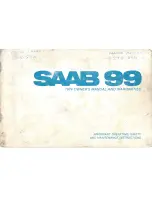
WARNING! (Continued)
•
Do not attempt to push or tow your vehicle
to get it started. Unburned fuel could enter
the catalytic converter and once the engine
has started, ignite and damage the con-
verter and vehicle. If the vehicle has a
discharged battery, booster cables may be
used to obtain a start from a booster bat-
tery or the battery in another vehicle. This
type of start can be dangerous if done
improperly, so follow this procedure care-
fully. Refer to “Jump-Starting” in “What To
Do In Emergencies” for further information.
CAUTION!
To prevent damage to the starter, do not
crank the engine for more than 15 seconds at
a time. Wait 10 to 15 seconds before trying
again.
If the engine is flooded, it may start to run, but
not have enough power to continue running
when the ENGINE START button is released. If
this occurs, continue cranking up to 15 seconds
with the accelerator pedal pushed all the way to
the floor. Release the accelerator pedal and the
ENGINE START button once the engine is run-
ning smoothly.
If the engine shows no sign of starting after two
15 second periods of cranking with the accel-
erator pedal held to the floor, the “Normal Start-
ing” procedure should be repeated.
After Starting
The idle speed is controlled automatically, and it
will decrease as the engine warms up.
MANUAL TRANSMISSION
NOTE:
The parking brake should be engaged and
the gear selector placed into REVERSE be-
fore leaving the vehicle, especially when
parked on an incline.
Your vehicle is equipped with a high torque
capacity dual disc clutch. The clutch pedal must
be fully pressed to the floor during each shift. As
you release the clutch pedal, lightly press the
accelerator pedal.
CAUTION!
•
Never drive with your foot resting on the
clutch pedal, or try to hold the vehicle on a
hill with the clutch pedal partially engaged,
as this will cause abnormal wear on the
clutch.
•
Failure to press the clutch pedal fully to the
floor may cause increased shift efforts, and
may result in damage to the clutch and
transmission.
(Continued)
CAUTION! (Continued)
•
Do not rest your hand on the gear selector
while driving, as this may result in trans-
mission damage.
•
Do not attempt to shift the transmission if
the rear wheels are spinning due to loss of
traction. Damage to the transmission may
occur.
Ensure the transmission is in first gear when
moving forward from a standing position.
CAUTION!
Failure to start out in first gear when moving
forward from a starting position may result in
damage to the clutch.
Shifting
Fully press the clutch pedal and lift your foot off
the accelerator pedal before shifting gears. As
you release the clutch pedal, lightly press the
accelerator pedal. Damage to the transmission
or clutch may occur if you do not fully press the
clutch pedal and lift off of the accelerator pedal
when shifting.
115
Summary of Contents for Viper 2017
Page 2: ......
Page 3: ......
Page 5: ...2...
Page 45: ...42...
Page 100: ...Overview 8 4 NAV Temperature Controls 97...
Page 107: ...Operating Tips Chart 104...
Page 113: ...110...
Page 180: ...8 MAINTENANCE SCHEDULES MAINTENANCE SCHEDULE 178 177...
Page 181: ...MAINTENANCE SCHEDULE Refer to the Service And Warranty Handbook for maintenance schedules 178...
Page 182: ...9 IF YOU NEED CONSUMER ASSISTANCE IF YOU NEED ASSISTANCE 180 179...
Page 184: ...181...
Page 185: ...182...
Page 186: ...10 INDEX 183...
Page 200: ...8...
Page 201: ......
Page 202: ......
Page 204: ...7 9 9 B 9 B...
Page 205: ...I B I...
Page 206: ......
Page 207: ......
Page 234: ...8 4 1 5 0 6 O v T Ry 2 E H O 7 E H 3 R 5 I2 8 R 2 4 2 9 5 O RO eI2 eR 5...
Page 247: ......
Page 282: ...X...
Page 384: ...F G H J 8 L H 9 M 9 G...
Page 385: ......
Page 386: ...2 3 4 5 67 8 9 7 9 9 B 8...
Page 387: ......
Page 388: ......
Page 389: ...Viper 1 7 Z D 1 2 6 A R A A A...
















































